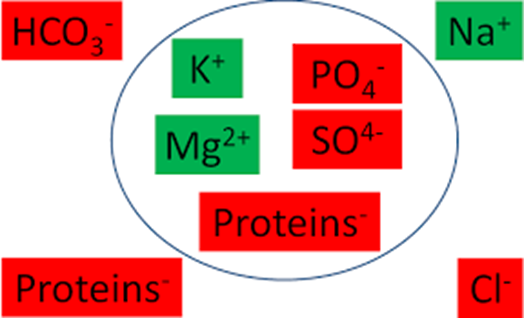What is the major extracellular (EC) electrolyte in the body?
Sodium.
Potassium.
Calcium.
Magnesium.
The Correct Answer is A

Sodium is the major extracellular electrolyte in the body.
It is responsible for maintaining the extracellular fluid volume, and also for regulation of the membrane potential of cells.
Sodium is exchanged along with potassium across cell membranes as part of active transport.
Choice B is wrong because potassium is mainly an intracellular ion.
It is important for nerve and muscle function, but it is not the predominant electrolyte in the extracellular fluid.
Choice C is wrong because calcium is not the major electrolyte in the extracellular fluid.
Calcium is mostly found in bones and teeth, where it forms a mineral reserve with phosphate.
Calcium also plays a role in muscle contraction, blood clotting, and enzyme activity.
Choice D is wrong because magnesium is not the major electrolyte in the extracellular fluid.
Magnesium is mostly found in bones, where it helps to stabilize the structure of ATP2.
Magnesium also participates in enzyme reactions, nerve and muscle function, and protein synthesis.
Nursing Test Bank
Naxlex Comprehensive Predictor Exams
Related Questions
Correct Answer is A
Explanation

This is because hemodialysis removes excess fluid and waste products from the blood, but it also removes some electrolytes, such as potassium.
Potassium is important for nerve and muscle function, especially the heart.
If potassium levels are too high or too low, it can cause irregular heartbeat or cardiac arrest.
Choice B is wrong because hypokalemia means low potassium levels, which is unlikely in renal failure unless there is excessive potassium loss from diarrhea, vomiting or diuretics.
Choice C is wrong because hyponatremia means low sodium levels, which can occur in renal failure due to fluid retention, but it is not directly related to hemodialysis.
Choice D is wrong because hypernatremia means high sodium levels, which can occur in renal failure due to reduced urine output, but it is also not directly related to hemodialysis.
Normal ranges for electrolytes are: Potassium: 3.5 to 5.0 mmol/L
Sodium: 135 to 145 mmol/L
Calcium: 8.5 to 10.5 mg/dL
Chloride: 96 to 106 mmol/L
Magnesium: 1.7 to 2.2 mg/dL
Phosphate: 2.5 to 4.5 mg/dL
Bicarbonate: 22 to 29 mmol/L
Correct Answer is ["23"]
Explanation
The correct answer is 22.5 mL.
To find the amount of mL, use the formula: (desired dose / available dose) x available volume.
In this case, desired dose = 30 mEq, available dose = 20 mEq, and available volume = 15 mL.
Plug these values into the formula: (30 mEq / 20 mEq) x 15 mL = 22.5 mL.
However, since the instructions say to round to the nearest whole number for adult clients, the final answer is 23 mL.
Whether you are a student looking to ace your exams or a practicing nurse seeking to enhance your expertise , our nursing education contents will empower you with the confidence and competence to make a difference in the lives of patients and become a respected leader in the healthcare field.
Visit Naxlex, invest in your future and unlock endless possibilities with our unparalleled nursing education contents today
Report Wrong Answer on the Current Question
Do you disagree with the answer? If yes, what is your expected answer? Explain.
Kindly be descriptive with the issue you are facing.
